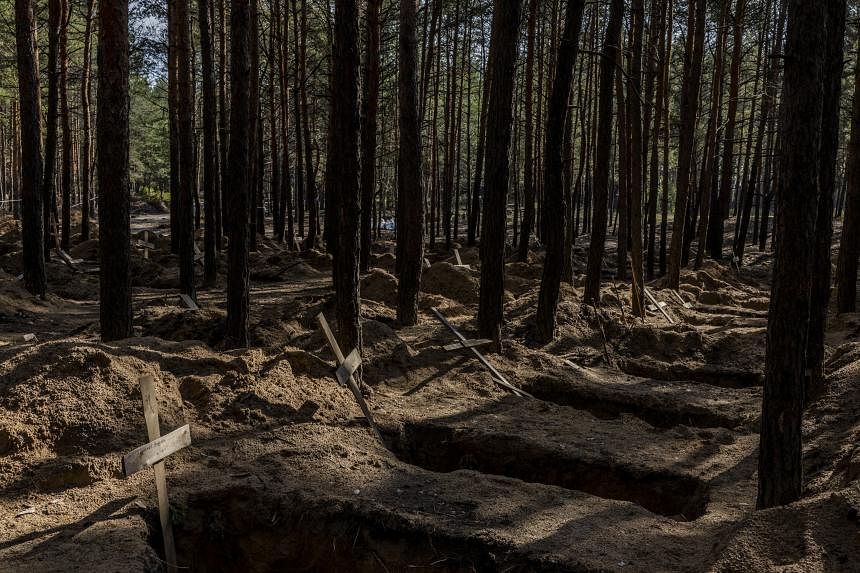KYIV - The torture of civilians, forced confinement and indiscriminate shelling are just some of the war crimes that Russia has committed in Ukraine, a United Nations-appointed panel of independent legal experts said in a report released this week.
The findings document crimes from the earliest months of the war, adding to months of reports of Russia’s humanitarian violations, including the execution of civilians in Bucha. In addition, a mass burial site was found near the town of Izyum, with many of the dead showing signs of torture, after it was recaptured by Ukrainian troops in September.
Evidence of atrocities in Ukraine is being collected with the intent of informing courts seeking to hold perpetrators to account.
“There is no case of conflict in recent memory that has awakened more interest in accountability,” said Mr Pablo de Greiff, a commissioner of the group that wrote the new report, which was released on Tuesday.
However, prosecutions for war crimes often take years to investigate and conclude long after conflicts end.
The new report chronicles human rights and international humanitarian law violations – the most severe of which are war crimes – that it says occurred in Ukraine’s Kyiv, Sumy, Kharkiv and Chernihiv regions in February and March.
Investigators found evidence of civilian torture and forced confinement. In one instance in Yahidne, a village in the northern region of Chernihiv, Russian soldiers held 365 civilians, including 70 children, in the basement of a local school for 28 days. There was no light, ventilation, showers or toilets.
Victims said the soldiers took their phones and threatened to shoot them if they failed to obey orders, and the basement was so crowded that some had to sleep in chairs or standing up for weeks on end. Some of those being held died.
The New York Times reported on the case in June.
The report also found evidence that the Russian military used explosive weapons in populated areas, deliberately killing civilians and attacking indiscriminately without “feasible precautions to reduce civilian harm”.
News reports on the war have frequently described such attacks. Intentionally targeting civilians, or areas where civilians are likely to congregate, is a war crime.
Other documented violations include the destruction of hospitals and schools and sexual and gender-based violence, which are also common in news reports on the war.
The report found two instances of war crimes committed by Ukrainian forces – abuse of Russian prisoners of war – but said that Russian forces are responsible for the most violations.
This new evidence is just a chapter in what has been called the biggest effort in history to hold war criminals to account, with numerous international agencies joining Ukrainian prosecutors in the ambitious and highly publicised undertaking.
The office of Ukraine’s Prosecutor-General, Mr Andriy Kostin, had recorded 41,085 crimes of aggression and war crimes as at Thursday, according to data shared by the agency on the messaging app Telegram.
Earlier in October, the UN’s top human rights body voted to increase scrutiny of human rights in Russia, the first action in the Human Rights Council’s 15-year history against one of the UN Security Council’s five permanent members.
The International Criminal Court, which has been investigating accusations of war crimes in Ukraine since February, has been tight-lipped about its progress, but Mr Karim Khan, the court’s chief prosecutor, said last week that his team had just returned from Izyum and Kharkiv, where Ukrainian police had found torture chambers in September.
Mr De Greiff, of the UN-appointed panel, said that he was coordinating with the International Criminal Court, as well as working with other courts that accept universal jurisdiction cases. He said it was too early to know whether his group’s evidence would be used in any trials. NYTIMES

